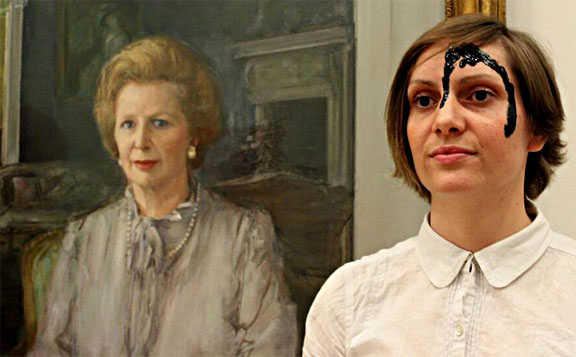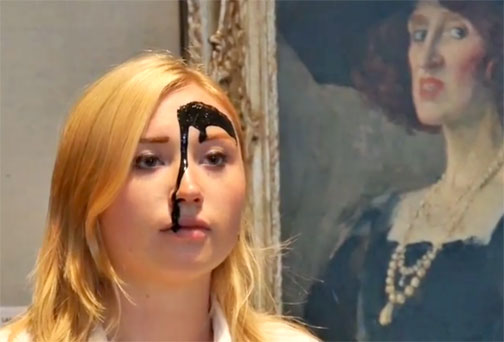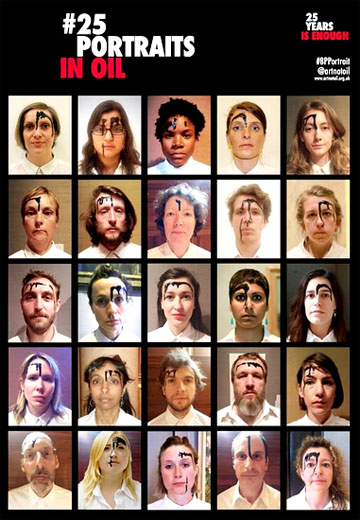BP’s Oily 25th Anniversary

I am one of 205 signatories to a letter published in The Guardian that asks the National Portrait Gallery of London, England to end BP funding of its esteemed annual competition and prize, the so-called BP Portrait Award. Published on June 24, 2014 the letter was timed to coincide with the museum “celebrating” 25 years of BP sponsorship.
The National Portrait Gallery’s BP Portrait Award of 2014 is an international competition. This year’s 2,377 entries came from 71 countries, including the United States. The event is also a major “Greenwashing” public relations campaign by one of the world’s leading polluters. Based upon my relentless criticism of the Los Angeles County Museum of Art (LACMA) for accepting BP funding since 2007, the Art Not Oil coalition of the United Kingdom asked that I sign their protest letter. The letter read in part:
“As arts practitioners and those working in arts institutions, we feel that the time is right for the cultural sector to be discussing alternatives to income gained from oil sponsorship in the same way that discussions about ending tobacco sponsorship took place more than two decades ago. Figures such as Archbishop Desmond Tutu have called for an apartheid-style boycott of fossil fuel companies, explicitly mentioning cultural institutions. Art shouldn’t be used to legitimize the companies that are profiting from the destruction of a safe and habitable climate.”
Also commiserating the 25th anniversary of BP sponsoring the National Portrait Gallery is the U.K. arts activist organization, Platform (a member of the Art Not Oil coalition). Platform released a report titled: Picture This – A Portrait of 25 years of BP Sponsorship. The report details “25 of BP’s major environmental catastrophes,” one for each year that BP sponsored the National Portrait Gallery Portrait Award since 1989.
The Platform report, which can be read online or downloaded as a printable .pdf document, opens with the statement, “How bad does a company have to be before an arts organization refuses to be associated with it or takes its money?” This is a question for Angelenos as much as it is for Londoners. The report also includes Picturing the Future, an article by painter Raoul Martinez, a former participant in the BP Portrait Awards. Martinez makes his case for rejecting oil company sponsorship of the arts, stating that “We can no longer allow the celebration of human creativity to provide cover for environmental destruction.”

In the run-up to the 25th anniversary of the BP Portrait Award of 2014, dozens of art activists from the Art Not Oil coalition staged a June 21, 2014 silent performance inside the National Portrait Gallery that they called, 25 Portraits In Oil.
Gathering in the gallery and wearing white, 25 performers simultaneously poured what appeared to be oil on their faces. These individuals then scattered throughout the museum, taking up positions to mutely stand before various portrait paintings in the collection. A short video documenting the 25 Portraits In Oil intervention at the National Portrait Gallery can be viewed here.

Another good example of arts activism would be the brilliant Reclaim Shakespeare Company, formed in response to BP’s sponsorship of the Royal Shakespeare Company in 2012. The “Guerilla Shakespeare” troupe’s website cleverly alters the Bard’s famous Hamlet line into the slogan “BP or not BP.” They perform public art interventions in Shakespearian style at venues and events funded by the oil giant. Most recently they have criticized the BP sponsored exhibit Vikings, life and legend, held at the British Museum. The Reclaim Shakespeare Company not only invaded the museum to hold an anti-BP performance replete with Vikings brandishing BP logo emblazoned shields, they lampooned the official British Museum promotional video for the Vikings exhibit with their own parody video, BP Vikings – Pillaging the planet.
The artists and activists of the U.K. are to be commended for their creative and non-violent opposition to oil-industry sponsorship of the arts. But there is much work to do, especially here in “liberal” L.A., where not a single protest against BP sponsorship of the Los Angeles County Museum of Art has occurred since that oleaginous relationship was established in 2007.
In my writings on the subject I have attempted to link BP’s sponsorship of LACMA, not just with environmental destruction, but with the wider topics of military adventures and imperialism (Iraq, Libya, etc); examinations of the debilitating supremacy corporate power exercises over the arts and democratic institutions, and the interlocking systemic nature of the crisis. These are just some of the questions that must be confronted if we are to succeed in righting the art world.
The Reclaim Shakespeare Company, zeroing in on BP as a company that devours the earth and gorges on its resources, reminds us all of the pertinent words of the Fool from Shakespeare’s tragic King Lear – “He’s mad that trusts in the tameness of a wolf.“

